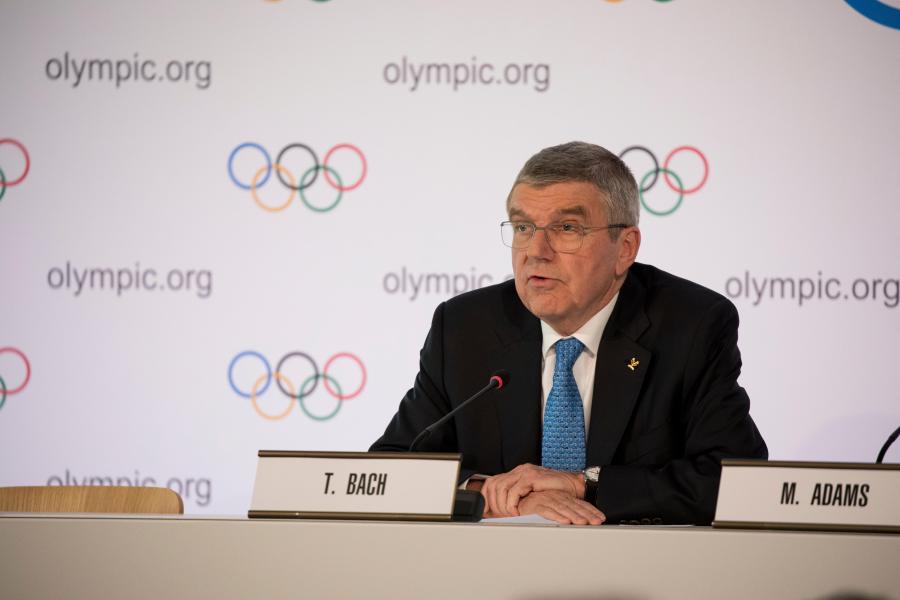


International Olympic Committee (IOC) president Thomas Bach speaks during a press conference in the Olympic House after the closing of the IOC Executive Board Meeting in Lausanne, Switzerland, March 4, 2020. (Greg Martin/IOC via Xinhua)
Preparations for Beijing 2022 are "on track and going well", according to International Olympic Committee (IOC) president Thomas Bach.
With Sept 22 marking the start of the 500-day countdown to the Winter Games, Bach delivered a positive assessment of the buildup during a video conference with media following an IOC Executive Board meeting on Wednesday.
"We heard a very encouraging technical report from the Coordination Commission who informed us the technical preparations are on track and going very well," Bach said.
At the board meeting, Beijing 2022 Coordination Commission chair Juan Antonio Samaranch cited advances in venue construction, development of the local organizing committee staff, and new sponsors and suppliers as further evidence of Beijing 2022's progress.
Regarding the COVID-19 pandemic, Samaranch said that Beijing 2022 has been working closely with Beijing and Hebei authorities and the national government to mitigate any negative impact that the situation could have on operations.
Samaranch described how such planning will be implemented this coming winter at a number of official test events.
He added that Beijing 2022 has been in direct contact with the relevant International Federations, developing plans for different scenarios at the test events.
Bach said the progress in rapid testing and development of a COVID-19 vaccine could be "greatly influential".
"We have also made contact with COC(the Chinese Olympic Committee) to benefit from the expertise of the developers of Chinese pharmaceutical companies to see and learn about the progress there. These will of course not only influence hopefully the preparations for Tokyo, but also for Beijing," Bach added.
Tokyo uncertainty
Speaking of the delayed Tokyo Summer Games, which are scheduled for summer 2021, Bach reiterated that local organizers and the IOC are preparing for multiple scenarios but declined to give specifics about the planning.
"It's just too early to give a concrete answer what will be the final scenario," Bach said."The only thing we can say is it will be about offering a safe environment for all participants."
Bach insisted the IOC has the full support of the Japanese government following the resignation of Prime Minister Shinzo Abe, but the look of next year's Games is still unclear.
"In the coming weeks you will see important and intensive discussions taking place with regard to different scenarios to COVID-19 counter measures," Bach said.
"We remain focused on delivering safe and successful Games next year."
The Tokyo 2020 Games were postponed to next year in an unprecedented decision in March as the pandemic swept across the globe.
Bach said while several aspects of the Games' organization, such as international spectators or qualifications processes, needed to be finalized months in advance, no deadline for those had yet been set.
"At some stage before the Games we will have to take these relevant decisions but right now I am not in a position to give you a concrete answer."
Bach also said that progress with vaccines and rapid testing for COVID-19 would not be the complete answer for staging the rescheduled Games.
"They will not be the silver bullet but they can greatly facilitate the organization of the Games," he said.
While the Japanese public has been skeptical about the July 23-Aug 8 Games going ahead, Olympic minister Seiko Hashimoto said this week: "I feel we have to hold them no matter what."
Bach declined on Wednesday to speculate on the Tokyo Olympics being held without fans in the venues, as has become the global reality for sports in 2020.
"We don't know how the world looks like tomorrow," Bach said. "So how can you expect from us to know how the world looks in 320 days from today?"
He asked athletes to accept any demands made of them in traveling to and staying in Japan next year.
"Nobody can just look at him or herself and say 'I do not want this' or'I don't think this is fair.' You have to show solidarity there in order to fight the virus," Bach said.
"If you need a quarantine to ensure a safe environment for all the participants of the Games, then you need to go to quarantine."

 Award-winning photos show poverty reduction achievements in NE China's Jilin province
Award-winning photos show poverty reduction achievements in NE China's Jilin province People dance to greet advent of New Year in Ameiqituo Town, Guizhou
People dance to greet advent of New Year in Ameiqituo Town, Guizhou Fire brigade in Shanghai holds group wedding
Fire brigade in Shanghai holds group wedding Tourists enjoy ice sculptures in Datan Town, north China
Tourists enjoy ice sculptures in Datan Town, north China Sunset scenery of Dayan Pagoda in Xi'an
Sunset scenery of Dayan Pagoda in Xi'an Tourists have fun at scenic spot in Nanlong Town, NW China
Tourists have fun at scenic spot in Nanlong Town, NW China Harbin attracts tourists by making best use of ice in winter
Harbin attracts tourists by making best use of ice in winter In pics: FIS Alpine Ski Women's World Cup Slalom
In pics: FIS Alpine Ski Women's World Cup Slalom Black-necked cranes rest at reservoir in Lhunzhub County, Lhasa
Black-necked cranes rest at reservoir in Lhunzhub County, Lhasa China's FAST telescope will be available to foreign scientists in April
China's FAST telescope will be available to foreign scientists in April